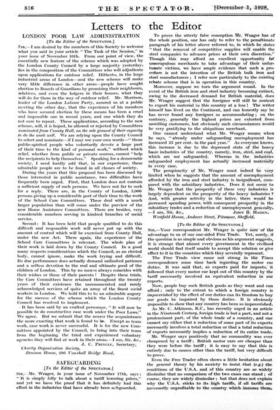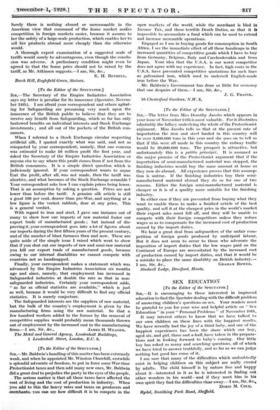[To the Editor of the - ScEctxroa.] Sia,—Your Correspondent Mr. Wenger - is
quite sure' of the advantage to us of our one-sided Free Trade. Yet,' surely; if the question is as simple and obvious as his argument suggests, it is strange that alixiost every government hi the civilized World should find itself unable to accept this solution or give effect to it in the countries which they severally represent'. - The Free Trade view came Out strong in the Tithes correspondence some time 'back regarding the motor car duties. It was said that, as exports paid for imports; It followed that every motor car kept out of this country by the tariff necessarily involved an equivalent reduction in Mir exporti.
Now, people buy such British goods as they want and can afford ; only to the extent to which a foreign country is impoverished by the effect of our duties can its freedom to buy our goods be impaired by those duties. It is Obviously impossible to show that any country has been so impoverished.
As Mr. C. Atkinson, K.C., has recently urged in an article in the Nineteenth Century, foreign trade is but a part,-and not a predominant part, of the whole trade of a country, and one cannot say either that a reduction of some part of its exports necessarily involves a total reduction or that a total reduction of exports necessarily implies a reduction of its entire trade.
Mr. Weager says positively that no commodity was ever cheapened by a tariff ; British motor cars are cheaper than they were before the tariff ; it is easy to say that this is entirely due to causes other than the tariff, but very difficult to prove.
Even the Free Trader often shows a little hesitation about the general theory by his anxiety to insist, that {e.g,) the conditions of the U.S.A. and of this country are so widely dissimilar that no comparison of the two cases can stand ; of course, they are widely dissimilar ; but that does not explain why the U.S.A. sticks to its high tariffs, if all tariffs are necessarily unprofitable to the country which imposes them.
Surely there is nothing absurd or unreasonable in the American view that command of 'the hOine market makes competition in foreign markets easier, because it assures to her the safety of a large-scale production, which enables her to sell her products abroad more cheaply than she otherwise would: A thorough expert examination of a suggested scale of tariffs would surely be advantageous, even though the conclu- sion was adverse.' A preliminary condition might even be agreed to that the home price should not be raised by the tariff, as Mr. Atkinson suggests.—I am, Sir, &c.,









































 Previous page
Previous page